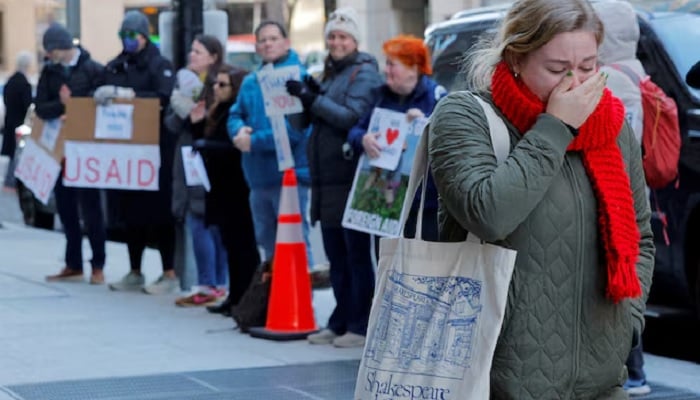Select Language:
According to a research study published on Tuesday, more than 14 million of the world’s most vulnerable individuals—approximately one-third of whom are young children—could face death due to the dismantling of US foreign aid by the Trump administration.
This study, featured in the esteemed Lancet journal, coincides with a UN conference taking place in Spain this week, where world and industry leaders aim to rejuvenate the struggling aid sector.
The US Agency for International Development (USAID) was responsible for more than 40% of global humanitarian funding until Donald Trump returned to the presidency in January.
Shortly thereafter, Trump’s close advisor—and the wealthiest person in the world, Elon Musk—boasted about having placed the agency “through the woodchipper.”
Davide Rasella, a researcher at the Barcelona Institute for Global Health (ISGlobal) and co-author of the study, warned that funding reductions “put at risk the sudden halt—and even reversal—of two decades of health progress for vulnerable populations.”
He noted, “For many low- and middle-income countries, the impact of these cuts would be comparable in magnitude to a global pandemic or a significant military conflict.”
By examining data from 133 nations, the international research team estimated that USAID funding has saved approximately 91 million lives in developing countries from 2001 to 2021.
Using modeling, the researchers projected that an 83% reduction in funding—an amount announced by the US government earlier this year—could result in over 14 million preventable deaths by 2030. This statistic includes more than 4.5 million children under five, translating to around 700,000 child deaths annually.
As a frame of reference, about 10 million soldiers are believed to have died during World War I.
The research indicated that programs supported by USAID were associated with a 15% decline in overall deaths; for children under five, the reduction was even steeper at 32%.
Additionally, USAID funding proved highly effective in preventing deaths from diseases: in countries receiving robust support, HIV/AIDS fatalities were 65% lower than in areas with minimal or no USAID assistance. Deaths from malaria and neglected tropical diseases were similarly halved.
Time for Expansion
Following the significant cuts to USAID, several other major donors, including Germany, the UK, and France, announced plans to decrease their foreign aid budgets.
These aid reductions, particularly within the European Union, could result in “even more additional deaths in coming years,” cautioned study co-author Caterina Monti of ISGlobal.
However, researchers stressed that the dire projections for deaths are based on the current level of pledged aid, which could change if the circumstances evolve.
World leaders are convening this week in Seville, Spain, for the largest aid conference in a decade, although the US will not be present.
“This is the moment to increase funding, not decrease it,” Rasella asserted.
Before its budget reduction, USAID accounted for just 0.3% of total US federal spending.
As per study co-author James Macinko from the University of California, Los Angeles, “American citizens contribute about 17 cents daily to USAID, roughly $64 annually. Many would likely support ongoing funding for USAID if they realized how impactful such a modest contribution can be in saving millions of lives.”







